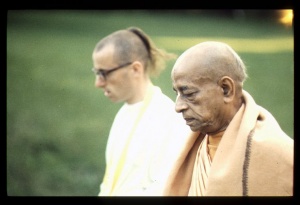CC Adi 17.232 (1975): Difference between revisions
(Vanibot #0027: CCMirror - Mirror CC's 1996 edition to form a basis for 1975) |
(Vanibot #0020: VersionCompareLinker - added a link to the Version Compare feature) |
||
| Line 2: | Line 2: | ||
<div style="float:left">'''[[Sri Caitanya-caritamrta (1975)|Śrī Caitanya-caritāmṛta (1975)]] - [[CC Adi (1975)|Ādi-līlā]] - [[CC Adi 17 (1975)|Chapter 17: The Pastimes of Lord Caitanya Mahāprabhu in His Youth]]'''</div> | <div style="float:left">'''[[Sri Caitanya-caritamrta (1975)|Śrī Caitanya-caritāmṛta (1975)]] - [[CC Adi (1975)|Ādi-līlā]] - [[CC Adi 17 (1975)|Chapter 17: The Pastimes of Lord Caitanya Mahāprabhu in His Youth]]'''</div> | ||
<div style="float:right">[[File:Go-previous.png|link=CC Adi 17.231 (1975)|Ādi-līlā 17.231]] '''[[CC Adi 17.231 (1975)|Ādi-līlā 17.231]] - [[CC Adi 17.233 (1975)|Ādi-līlā 17.233]]''' [[File:Go-next.png|link=CC Adi 17.233 (1975)|Ādi-līlā 17.233]]</div> | <div style="float:right">[[File:Go-previous.png|link=CC Adi 17.231 (1975)|Ādi-līlā 17.231]] '''[[CC Adi 17.231 (1975)|Ādi-līlā 17.231]] - [[CC Adi 17.233 (1975)|Ādi-līlā 17.233]]''' [[File:Go-next.png|link=CC Adi 17.233 (1975)|Ādi-līlā 17.233]]</div> | ||
{{CompareVersions|CC|Adi 17.232|CC 1975|CC 1996}} | |||
{{RandomImage}} | {{RandomImage}} | ||
==== TEXT 232 ==== | ==== TEXT 232 ==== | ||
<div class="verse"> | <div class="verse"> | ||
: | :'dekhinu' 'dekhinu' bali' ha-ila pāgala | ||
:preme nṛtya kare, haila vaiṣṇava āgala | :preme nṛtya kare, haila vaiṣṇava āgala | ||
</div> | </div> | ||
| Line 18: | Line 17: | ||
<div class="synonyms"> | <div class="synonyms"> | ||
dekhinu—I have seen; dekhinu—I have seen; | dekhinu—I have seen; dekhinu—I have seen; bali'-saying; ha-ila—became; pāgala—mad; preme—in the ecstasy of love; nṛtya—dancing; kare—does; haila—became; vaiṣṇava—devotee; āgala—first class. | ||
</div> | </div> | ||
| Line 25: | Line 24: | ||
<div class="translation"> | <div class="translation"> | ||
Saying | Saying "I have seen! I have seen!" and dancing in ecstatic love as though mad, he became a first-class Vaiṣṇava. | ||
</div> | </div> | ||
| Line 32: | Line 31: | ||
<div class="purport"> | <div class="purport"> | ||
There was a Muslim tailor near the house of Śrīvāsa Ṭhākura who used to sew the garments of the family. One day he was very pleased with the dancing of Śrī Caitanya Mahāprabhu; indeed, he was enchanted. The Lord, understanding his attitude, showed him His original form as Kṛṣṇa. The tailor then began to dance, saying, | There was a Muslim tailor near the house of Śrīvāsa Ṭhākura who used to sew the garments of the family. One day he was very much pleased with the dancing of Śrī Caitanya Mahāprabhu; indeed, he was enchanted. The Lord, understanding his attitude, showed him His original form as Kṛṣṇa. The tailor then began to dance, saying, "I have seen! I have seen!" He became absorbed in ecstatic love and began to dance with Lord Caitanya. Thus he became one of the foremost Vaiṣṇava adherents of Śrī Caitanya Mahāprabhu. | ||
</div> | </div> | ||
Latest revision as of 16:19, 26 January 2020

A.C. Bhaktivedanta Swami Prabhupada
TEXT 232
- 'dekhinu' 'dekhinu' bali' ha-ila pāgala
- preme nṛtya kare, haila vaiṣṇava āgala
SYNONYMS
dekhinu—I have seen; dekhinu—I have seen; bali'-saying; ha-ila—became; pāgala—mad; preme—in the ecstasy of love; nṛtya—dancing; kare—does; haila—became; vaiṣṇava—devotee; āgala—first class.
TRANSLATION
Saying "I have seen! I have seen!" and dancing in ecstatic love as though mad, he became a first-class Vaiṣṇava.
PURPORT
There was a Muslim tailor near the house of Śrīvāsa Ṭhākura who used to sew the garments of the family. One day he was very much pleased with the dancing of Śrī Caitanya Mahāprabhu; indeed, he was enchanted. The Lord, understanding his attitude, showed him His original form as Kṛṣṇa. The tailor then began to dance, saying, "I have seen! I have seen!" He became absorbed in ecstatic love and began to dance with Lord Caitanya. Thus he became one of the foremost Vaiṣṇava adherents of Śrī Caitanya Mahāprabhu.